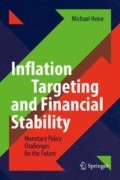Abstract
The long period of monetary accommodation after the Great Financial Crisis has triggered an intensive debate about the potentially negative side effects of these policies—especially regarding the growth and distribution of financial wealth and the stability of financial market development. Clearly, the interest income of savers has declined as a result of monetary policy in the euro area, while borrowers have benefited. The long-term income to be expected from savings funds, especially for retirement, has diminished, due to the dearth of returns. Therefore, funds need to be replenished. Financial markets have become more exposed to the risk of high asset valuations and—in recent years—to a return of rising leverage in most economies. Such side effects of monetary policy that intend to stimulate economic activity in the short term pose risks for future long-term growth. For the euro area, the ECB’s monetary policy has affected countries differently, benefiting economies with higher net borrowing in the private and public sector. Also, the rise of Target II imbalances in the payments system of the ECB shows that there has been a redistribution of sovereign risks in the course of the central bank’s asset purchase program.
Access this chapter
Tax calculation will be finalised at checkout
Purchases are for personal use only
Notes
References
Adam K, Tzamourani P (2016) Distributional consequences of asset price inflation in the euro area. Eur Econ Rev 89:172–192
Allianz (2017) Brandmeir K, Holzhausen A. Returns on private assets in selected EMU countries (Working Paper No. 211)
Allianz (2018) Brandmeir K, Holzhausen A. The net interest income of private households (Working Paper No. 212)
Deutsche Bundesbank (2016) Distributional effects of monetary policy. Monthly Report September 2016, 68(9)
Domanski D, Scatigna M, Zabai A (2016) Wealth inequality and monetary policy. BIS Quarterly Review, March 2016
Draghi M (2015) The ECB’s recent monetary policy measures, effectiveness and challenges. Lecture presented at the Camdessus Lecture of the IMF in Washington, DC on May 14
El-Herradi M (2017) The redistributive impacts of ECB’s unconventional monetary policies: evidence from Italian household surveys. Phd Thesis (Working Paper). University of Bordeaux
ESRB (2016) European Systemic Risk Board. Macroprudential policy issues arising from low interest rates and structural changes in the EU financial system
ESRB (2017) European Systemic Risk Board. Annual report 2016
ESRB (2018) European Systemic Risk Board. Annual report 2017
Furceri D, Loungani P, Zdzienicka A (2016) The effects of monetary policy shocks on inequality (Working Paper No. 16/245). IMF.
Geneva Association (2018) Schanz K. Research brief: understanding and addressing the global insurance protection gaps
Heise M (2013) Emerging from the Euro debt crisis: making the single currency work. Springer, Berlin
Heise M (2018) The debt shackles return. Project Syndicate, May 15
International Monetary Fund (2017) Global financial stability report, October 2017: is growth at risk?
International Monetary Fund (2018a) Global financial stability report, October 2018: a decade after the global financial crisis: are we safer?
International Monetary Fund (2018b) Global financial stability report, April 2018: a bumpy road ahead
International Monetary Fund (2018c) World Economic Outlook, April 2018: cyclical upswing, structural change
Juselius M, Borio C, Disyatat P, Drehmann M (2016) Monetary policy, the financial cycle and ultra-low interest rates (Working Paper No. 569). Monetary and Economic Department, BIS.
Kunovac D, Mandler M, Scharnagl M (2018) Financial cycles in euro area economies: a cross-country perspective (Deutsche Bundesbank Discussion Paper No. 04/2018)
O’Farrell R, Rawdanowicz L, Inaba K (2016) Monetary policy and inequality (Working Paper No. 1281). OECD
Robinson G, Weyns G, Billfalk-Kelly I, Kelly C, Urwin J (2018) Could there be an upside to a pension deficit? UBS Global Research
Sinn HW (2014) The Euro Trap: on bursting bubbles, budgets, and beliefs. Oxford University Press, Oxford
Sinn HW (2018) The ECB’s Fiscal Policy (CESifo Working Paper No. 7019). Munich Society for the Promotion of Economic Research—CESifo GmbH
Tucker P (2017) Central banks as trustees for monetary system stability: combining banking supervision with monetary policy. In: ECB legal conference 2017
Wolf M (2018) Why the Swiss should vote for ‘Vollgeld’. Financial Times, June 6
Author information
Authors and Affiliations
Rights and permissions
Copyright information
© 2019 Springer Nature Switzerland AG
About this chapter
Cite this chapter
Heise, M. (2019). Side Effects of Monetary Accommodation. In: Inflation Targeting and Financial Stability. Springer, Cham. https://doi.org/10.1007/978-3-030-05078-8_4
Download citation
DOI: https://doi.org/10.1007/978-3-030-05078-8_4
Published:
Publisher Name: Springer, Cham
Print ISBN: 978-3-030-05077-1
Online ISBN: 978-3-030-05078-8
eBook Packages: Economics and FinanceEconomics and Finance (R0)

